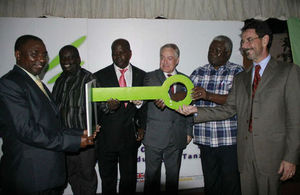UK Support to Tanzania Media
DFID supports Tanzania Media Fund launch of new grant window

Head of DFID Marshall Elliot launches new grant window for Tanzania Media Fund with Director of Information and Executive Director of TMF
On Tuesday 8th October, Tanzania Media Fund (TMF) launched its new grant window to media institutions. The grant, called the Transformation Grant, is a special type of grant that is to be provided to media institutions that are committed in tackling reforms and structural barriers in their institutions. It has four specific objectives:
Strategic Objective 1: addressing the lack of mentoring culture in Tanzanian newsrooms, which results in lack of sustainable professional standards, ethics and ultimately lack of quality journalism;
Strategic Objective 2: Investigative journalism stimulated through practical investigative. This objective addresses the decline in investigative journalism in Tanzanian media houses, and the general decline in time spent on in-depth research and assembling reliable information;
Strategic Objective 3: Economically sustainable media developed through creative media business models that guarantee more revenue and maximize profits. This objective recognizes the difficulty of the economic environment for the media in Tanzania, which results among others in bad remuneration of journalists and ultimately influences independence of the media as it makes them more susceptible to ‘brown envelope journalism’.
Strategic Objective 4: new media and social network supported to guarantee alternative online media outlets that would provide a platform for reliable information to the public (right to know) and create platforms for citizens voices (right to tell). The evolution of the web and a rapid deepening of internet and mobile phone penetration in Tanzania is something that the media needs to deal with effectively and, ultimately, profit from.
The Head of DFID in Tanzania, Mr. Marshall Elliott delivered a speech to officiate this event that was attended by about 100 participants from the media industry, government, civil society and diplomatic mission and hosted by the Switzerland’s Ambassador in Tanzania. In his speech he said; ‘First of all allow me to share my deep appreciation for the opportunity to launch the new institutional transformation grant window of the Tanzania Media Fund, which is jointly financed by Denmark, Ireland, Switzerland and the UK. Citizen empowerment and accountability is a core priority for all the bilateral missions that are funding the Tanzania Media Fund. DFID’s over-arching policy for 2011 – 14 is clear – it states that we will “use the aid budget to support the development of local democratic institutions, civil society groups, the media and enterprise”.
Open Government and Transparency is very much on the international agenda right now. As part of the G8 agenda in June this year, the UK led G8 countries in their goal to make more government data available to citizens, clearly published on the internet and free of charge. In many developing countries, citizens have little or no access to information on, for example, how their government collects or spends resources. As a result, they are unable to hold governments to account for how these resources are used. The Government of Tanzania made important commitments both before, and during the UK’s G8 presidency to improve transparency around how natural resources such as oil, gas, minerals and land are used. Media is a critical player in this transparency agenda.
I congratulate the Tanzania Media Fund for its continued commitment in promoting a free, pluralistic, independent and vibrant media in Tanzania. Supporting the media towards fulfilling its critical role in promoting transparency and domestic accountability is a noble undertaking. It is in everyone’s interest, Government, civil society, the media itself, to see a vibrant, responsible and informed media; a media in which journalists of integrity are able to report accurately and without undue pressure or influence.
I also congratulate the Tanzania Media Fund for its lesson learning which has identified the need to address structural reforms in the media sector if we are to see sustainable quality media content in Tanzania.
We, the Development Partners supporting the Media Fund are therefore delighted to see the development of the Transformation Strategy and the launch of the Transformation Grant Window. The Transformation Grant Window will enable interventions supported by the Media Fund to leave a lasting legacy within the media institution beyond the grant making period. It will better position the media to fulfil sustainably its watch-dog function and in empowering citizens to seek accountability pursuant to their Constitution rights.
Transformative change is never easy. We have heard this evening from of the first set of grantees about what’s involved. One thing is for sure, change has to be driven and supported from the top and so commitment by media owners and managers to this approach is crucial. Business as usual will not lead to desired changes. I call upon all media organizations that will receive funding and technical support from TMF to fully grasp this opportunity and tackle structural problems that hinder quality journalism and development of the media profession in Tanzania.
The UK and other development partners that jointly support the Tanzania Media Fund pledge our continued cooperation towards working with media stakeholders to contribute to ensuring that the media plays its part in promoting the development agenda in Tanzania.
I now have the pleasure to declare the Transformation Grant Window of the Tanzania Media Fund officially launched and I wish all the success to the first 14 grantees as they embark into the process of transforming their media institutions.’
Tanzania Media Fund is a programme that is jointly funded by the UK, Switzerland and Denmark since 2008 to promote and support quality journalism that better informs the public, contributes to debate and thereby increases public demand for greater accountability across Tanzania. It focuses on investigative journalism and public interest journalism. Key services provided by TMF include: small and medium grants to individual journalists and media institutions; tailored capacity building interventions coupled with a strong mentoring support.